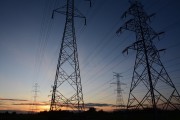Ever since Barack Obama's election, Stephen Harper has set a single goal for Canada's climate policy: "harmonizing" our efforts to cut greenhouse gas pollution with the United States' plans.
Like marriage, harmonizing sounds good in theory -- but it doesn't work unless you find the right partner.
Two American senators recently published a long-anticipated climate and energy bill called the American Power Act, winning qualified praise from environmental groups and some industry players. But the U.S. pundits were unanimous in stating that the bill has a tough fight ahead to win the political support it needs to go into law.
If climate policy was a romantic comedy, the U.S. would be that charming guy with a lot of potential who still has some growing up to do. Unfortunately, Canada's position comes closest to another stock character from romantic comedies: the girl so afraid of being alone that she'll settle for anyone.
Just look at pricing greenhouse gas emissions, the single most important policy we need in Canada to reduce them. Our government's approach now shifts frequently, reflecting the ever-changing debate south of the border. Cap-and-trade? Sure, if the U.S. says so. Oh wait -- they prefer sector-by-sector regulations this week? So do we.
In January, Canada even adopted the U.S.'s 2020 emissions target as its own, thus becoming the only country to weaken its level of ambition since the Copenhagen climate talks.
Of course the U.S. is an important factor in any major government initiative in Canada. But as in other relationships, the consequences of harmonizing on climate policy are not straightforward.
There are areas where the U.S. is already far ahead of Ottawa. Obama's 2010 budget request contains 18 times more funding for new renewable power -- per capita -- than Canada's 2010 budget. So if we truly want to "harmonize," it would mean a much stronger federal investment in clean energy.
In other areas, Canada is in front, at least in terms of readiness to act.
While the U.S. Congress struggles to agree on a law to cap greenhouse gas pollution, Parliament passed legislation empowering the government to do this two decades ago. In 2005, Paul Martin's government listed greenhouse gases as eligible for regulation under that law. So if Stephen Harper wanted to cap greenhouse gas emissions today, he already has the legal tools he needs.
Recent media reports indicate Environment Minister Jim Prentice is considering a move to phase out conventional coal plants in Canada without waiting for the U.S. to do the same. This sounds encouraging, although it's hard to gauge how serious this might be until we see a specific proposal.
The fact is that, despite their linked economies, Canada and the U.S. face different challenges in tackling greenhouse gases. This is partly because Canada plans a massive expansion of oilsands development -- an initiative that has no U.S. equivalent.
Economic analysis shows that if Canada were to adopt the same price on greenhouse gas emissions that the U.S. needs to reach its 2020 target, we would fail to reach our own 2020 goal. So if our government wants to meet its commitment, it cannot let Washington's efforts be the upper limit on Canada's policy choices.
Like Canada's government, many industry players also argue for harmonization with the U.S., mainly because of worries about their competitive position if Canada were to move faster than our largest trading partner.
It's a legitimate concern. Fortunately, independent economic analysis shows that the vast majority of Canada's sectors would continue to prosper even if Canada led the U.S. in cutting emissions. And for sectors that might be at risk, governments can provide specific protection.
Clearly, competitiveness concerns need not be showstoppers for governments to cut emissions.
If this was a movie, we all know how the script would go. The girl who's afraid to be alone would finally decide to try something new, all by herself. She would struggle at first but persevere, and soon she'd be a success. Everyone would see her with new eyes; her phone would ring off the hook.
We need a happy ending to Canada's climate story, too, and waiting around for the boy next door isn't it.
Harper plays wallflower on climate
May 29, 2010
Op-ed
Published in Winnipeg Free Press (May 29, 2010), Edmonton Journal (May 31, 2010)
Tags:
Related Research & Analysis

Oil & Gas
April 26, 2022
Op-ed
Balancing energy security and climate action in 2022
Our short-term responses to energy security needs must not jeopardize our future climate imperatives

Buildings, Carbon Removal, Electricity, Equitable Transition, Oil & Gas, Remote Communities, Transportation
October 31, 2025
Op-ed
For Canada to be ‘climate competitive’ we need to stay the course on key industrial policies
Pembina Institute testimony to the House Environment and Sustainable Development Committee
Programs
Leading the transition to clean energy requires advancing solutions to today’s energy challenges from various angles.
The Pembina Institute has spent four decades working to reduce the environmental impacts of Canada’s energy production and to provide actionable ideas on how to implement clean energy.


